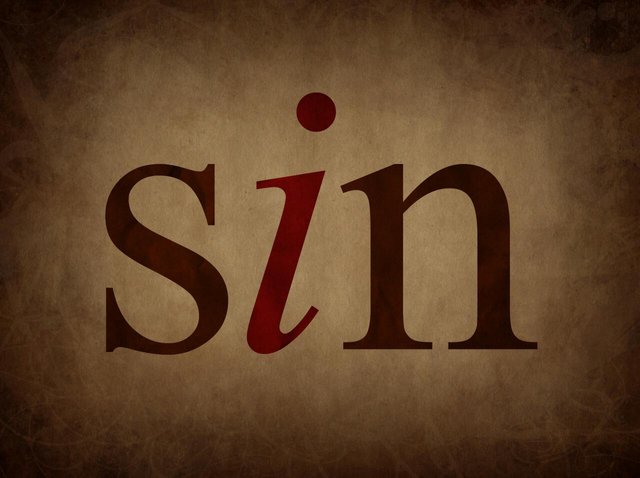
While studying in seminary, in Louisville, I had a job at Chick-fil-A. Taking drink orders was far more complicated than it needed to be because so many people ordered “a Coke.” For me, a native Northeast Missourian, a Coke means a specific dark cola. For those living in more Southern states “a coke” is synonymous with soda. When people ordered a Coke I had to learn to ask “which kind?” In my lingo, all Cokes are sodas but not all sodas are Coke. To many of our customers, all sodas were Cokes. There are many other English words like this which we use interchangeably, but on further inspection, there actually is a bit of difference in meaning.
In the Bible, the terms, sin and iniquity, are often used interchangeably. We know that both of them aren’t good and we know that, in some sense, they are an offense against a holy God. In fact, if you look up the word, iniquity, in most Bible dictionaries, you’ll be redirected to the word “sin,” yet, there is a bit of a difference between these two concepts. At least 70 times, we see these terms used together.
What Do Sin and Iniquity Mean in the Bible?
There are three principle Hebrew words which are often used interchangeably. These words are often translated as sin, iniquity, or transgression. Chattah, which is most often translated as sin, means to miss the mark. Awon, often translated as iniquity, relates more to the inner character and points to an intentional twisting of a given standard. Pesha, often translated as transgression, is more of a willful rebellion against the given standard. We see these words in their nuances and also used interchangeably in Psalm 51:
We see here that while there is a great deal of similarity between sin and iniquity (and they are at times used interchangeably), there is also a bit of a difference. Much as I had to ask “which kind” when someone ordered a Coke, so also when we see the word, “iniquity,” in the Scriptures, we shouldn’t just assume it is merely a synonym for sin.
This illustration is a bit of an over-simplification, but perhaps, it will prove helpful. If an archer wildly misses a mark, we would use the word chattah. He was shooting for something and he came up short. Morally speaking, we are aiming for righteousness and actions which accurately model the God we were created to image. As the apostle John said, “Sin is lawlessness.” It is breaking the law and missing the standard which is set for us. But we’ve yet to say why this archer missed the mark. If we wanted to explore why the archer fell short, we would likely use a word like awon (or iniquity). Iniquity points to the character/heart which causes the missed shot. Iniquity points to our perverse desire to twist God’s holy standard. We break God’s standard because our iniquity drives us to twisting God’s Word.
What Does Jesus Say about Sin?
This is similar to what Jesus taught in Luke 6. It is out of the overflow of the heart that the mouth speaks. The issue is not simply the outward expression of sin, it is also the heart which created the standard-breaking behavior. This will impact the way we disciple (and especially the way we parent). We are not merely aiming for changed behavior. In other words, our goal is not simply to stop sin, but also to address the iniquity of the heart which fueled the sinful action.
Notice, What God Does with Isaiah:
Then one of the seraphim flew to me, having in his hand a burning coal that he had taken with tongs from the altar. 7 And he touched my mouth and said: “Behold, this has touched your lips; your guilt [awon] is taken away, and your sin [chattah] atoned for. (Isaiah 6:7)God doesn’t only atone for our sin, he also takes away our iniquity. The work of Christ addresses sin, transgression, and iniquity to the fullest. This is great news. God doesn’t just clean the outside of the cup, but he does substantial heart work. He finds us at our vilest and cleanses us. There is no sin or iniquity so deep that Christ cannot forgive, heal, and transform, for he was “pierced for our transgressions and crushed for our iniquities…” (Isaiah 53:5)
Mike Leake is the Lead Pastor at FBC Marionville in Marionville, Missouri. He is currently pursuing his M.Div. at Southern Baptist Theological Seminary. Mike is married to Nikki, and they have two children, Isaiah and Hannah. You can follow him on Twitter @MikeLeake.
Posted from my blog with SteemPress : https://sindefeated.com/iniquities-sin/
Hi! I am a robot. I just upvoted you! I found similar content that readers might be interested in:
https://www.crosswalk.com/faith/bible-study/what-are-iniquities-and-how-are-they-different-than-our-sins.html
Downvoting a post can decrease pending rewards and make it less visible. Common reasons:
Submit
Downvoting a post can decrease pending rewards and make it less visible. Common reasons:
Submit